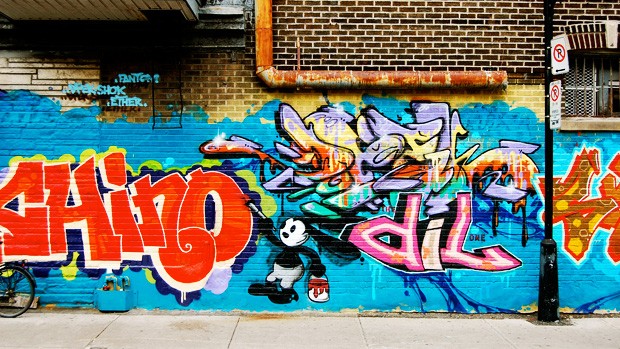Student journalists explore the city at night
 Journalism student Hélène Bauer: "I was already very familiar with the subject of graffiti, so the biggest challenge for me was to try and explain it to a larger audience." | Photo by Picbot (Flickr Creative Commons)
Journalism student Hélène Bauer: "I was already very familiar with the subject of graffiti, so the biggest challenge for me was to try and explain it to a larger audience." | Photo by Picbot (Flickr Creative Commons)
Students enrolled in Concordia’s undergraduate and graduate diploma programs in journalism recently collaborated with the CBC to create a series of stories on the theme of Montreal after Dark.
We spoke to one of the journalists, graduate diploma student Hélène Bauer, about her experience.
How did this collaboration come about?
Hélène Bauer: This project was for our class “JOUR 528 - The Digital Magazine." It was a class project that our teacher Lawrence Nyveen assigned to us at the beginning of the term.
He told us that it would be published on the CBC's website at the end of the term. It's the third year in a row that this collaboration has taken place.
Two journalists from the CBC came to our class and asked us to choose a topic that we wanted to cover. It had to be broad enough so that we would be able to find enough story ideas.
We came up with a lot of different ideas and the one that stuck was the theme "Montreal after Dark." It was perfect because the CBC was looking for stories that they wouldn't be able to find themselves, for a fresh perspective, and as young students, we had a lot of different perspectives of what nightlife in Montreal meant.
Which students were involved?
HB: We were a class of about 15 or 20 students working on these projects. The class was a mix of third-year undergraduate students and graduate diploma students.
How did the collaboration work?
HB: Each group worked independently. First, we submitted our story idea to our teacher, who approved it. Then we went to the CBC for a pitch meeting with four CBC producers. They heard our ideas and gave us feedback and helped us steer them in the right direction.
Then we worked on our stories independently and submitted everything to the CBC. They looked at the stories and asked us to make some edits, and we saw the final product published on the website last Wednesday, April 6.
Which stories did you cover?
HB: My group covered the graffiti story. Other groups covered a bakery that works at night to provide baked goods in the morning, 24-hour restaurants, bouncers and the haunted buildings of Montreal.
What did you learn from the project?
HB: I was already very familiar with the subject of graffiti, so the biggest challenge for me was to try and explain it to a larger audience, especially the CBC audience, which is often older and might not be very familiar with the art form.
I had to break it down and dissect the subject, explaining it in the simplest terms. For example, I was trying to figure out how to explain what a "graffiti crew" is, which I later translated into "a collective of artists."
It was also really inspiring to see how the CBC producers work and how quickly they are able to turn around a story and make it that much stronger. I learned the most during the edits that we had to make to our video and text. I worked on both of those elements and the comments I received were on point and really improved the quality of my work.
What was the most interesting story you've worked on during your time at Concordia, and why?
HB: I'm really lucky that the program has allowed me to work on any story ideas that interest me. I was also the Current Affairs editor at The Link during the school year, so I wrote a lot of different articles and was able to explore many different subjects.
I've mostly been focusing on stories about the urban environment, exploring how communities are using public space for their own means, like with graffiti and urban exploration, for example.
I'm also interested in the subject of race and how communities are affiliated with the City. I've been lucky to meet inspiring people through my stories.
What's next for you after graduation?
HB: I will be moving back to Europe. I'm from Switzerland. In May, I will be moving to Paris. I'll try to find a job in journalism there or do freelance work.
Find out more about Concordia’s Department of Journalism.


